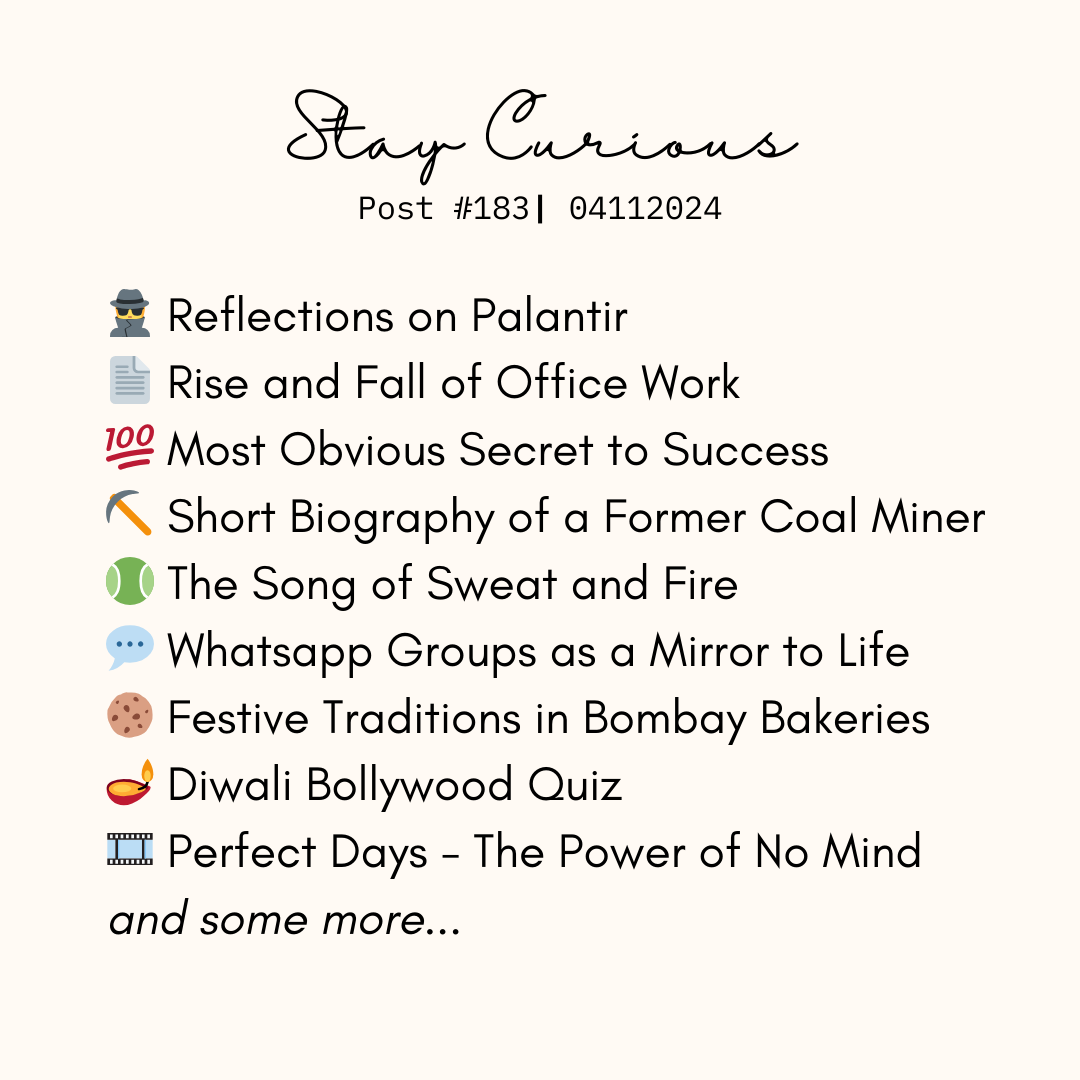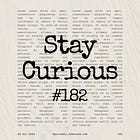📚 Reflections on Palantir, Rise and fall of office work, Short biography of a former coal miner, Whatsapp groups as a mirror to life, Festive traditions in Bombay bakeries
The Song of sweat and fire, Diwali bollywood quiz, Perfect days - the power of no mind and more
Hello, this is post #183.
Diwali celebrations at home have no match - a lot of time with the family, a lot of food, decorating the house, crackers in the evening and our house party with friends - it was never ending fun.
We upped the game on decoration this year, and decided to build our own installation of Jharokha inspired signature wall. DIYing it kept us busy in a most satisfying way. The party itself was a blast (no pun intended). Great food, some fun games and lots of photos. Here’s a quick glimpse for you.
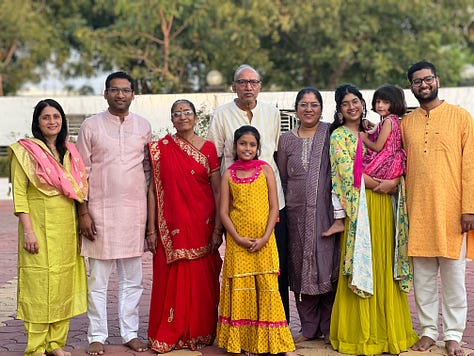
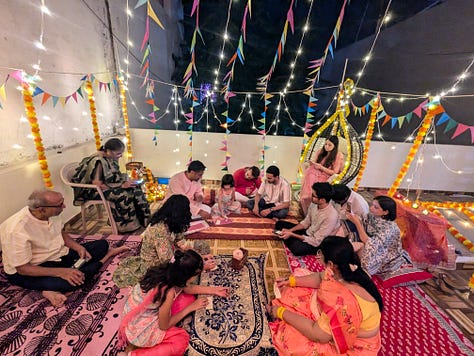
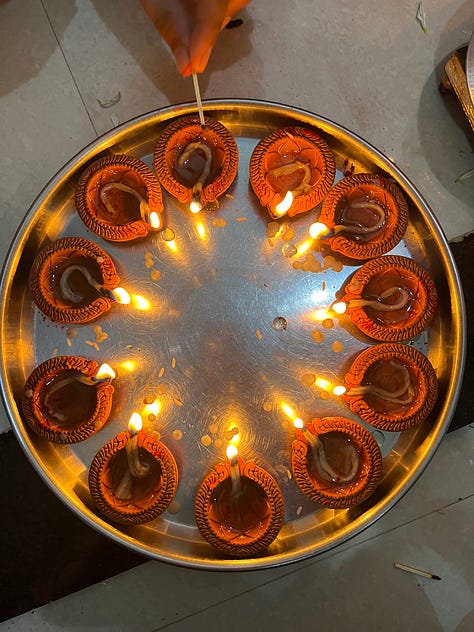
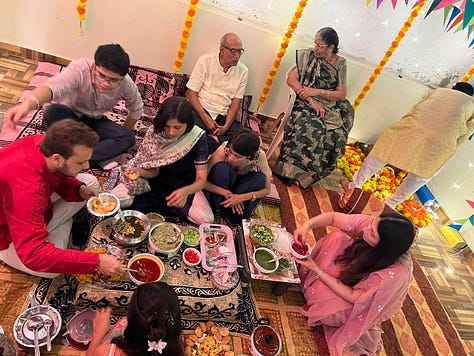
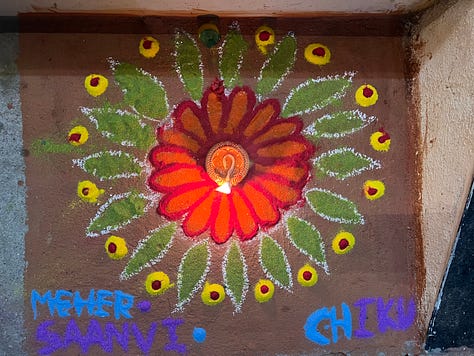

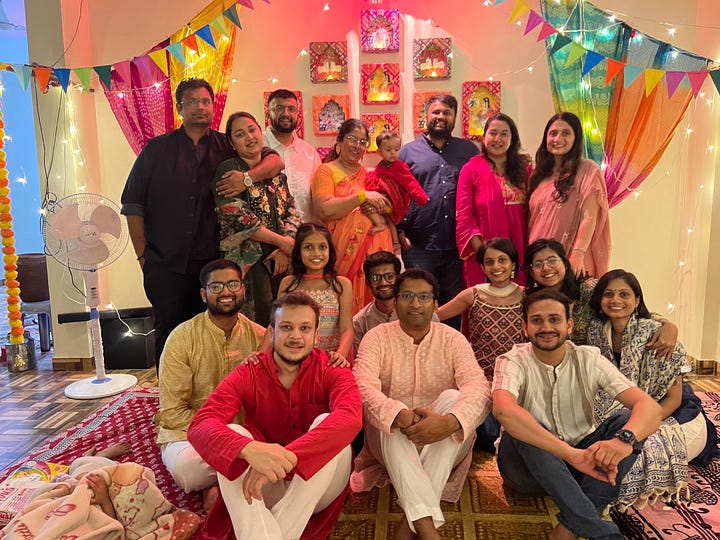

After a quick diwali break at home, I am back to the base. October went super fast. Between all the travels, Visa work, meeting friends & family and Diwali celebrations - my work & reading took a bit of a setback. I am slowly getting rebooted. You will notice some changes in the upcoming editions and I am confident that they are for the better. Till then, please bear with me and stay curious.
Here’s a quick lineup for today:
And now, to the main features…
🕵️ Reflections on Palantir
The overall ‘vibe’ of the company was more of a messianic cult than a normal software company. But importantly, it seemed that criticism was highly tolerated and welcomed – one person showed me an email chain where an entry-level software engineer was having an open, contentious argument with a Director of the company with the entire company (around a thousand people) cc’d. As a rationalist-brained philosophy graduate, this particular point was deeply important to me – I wasn’t interested in joining an uncritical cult. But a cult of skeptical people who cared deeply and wanted to argue about where the world was going and how software fit into it – existentially – that was interesting to me.
There are many fascinating stories in Nabeel S. Qureshi’s essay “Reflections on Palantir”, but the above stood out to me.
Nabeel's essay is quite the eye-opener beyond the usual "spy tech" and "NSA surveillance" associations of Palantir. With over eight years at the company, he shares insights into the team dynamics and unique culture that define Palantir, painting a more nuanced picture of its operations and ethos.
It's a fascinating read that provides a fresh perspective on Palantir’s world, revealing aspects that often remain hidden from public view. Definitely worth your time!
📄 Rise and Fall of Office Work
“The past, present, and future of office work” is part of David Deming's series on the history of technological disruption in the labor market.
Starting with the early days of stenography, he delves into how typewriters transformed written communication, allowing it to extend beyond the limited scope of professional stenographers. Secretaries, who became indispensable for typing and document management, played a pivotal role in formalizing communication and information storage.
The advent of personal computers, however, marked a turning point that reshaped roles and introduced new ways of handling information. The events that followed illustrate a significant shift in both workplace dynamics and the broader skill demands in labor, making for a compelling read.
There is a clear analogy here to the impact of mechanization on farm labor. For most of human history, the bottleneck to increasing food production was physical power. Steam and electricity eventually relaxed that constraint, and farm work mostly disappeared because we only need so much food.
Similarly, the key bottleneck in business decision-making for most of modern history was a lack of information. Advances in information collection, storage and retrieval eventually relaxed that constraint, and now we are awash in data. Routine office jobs were created in a time of information scarcity, and they may no longer be needed.
(via MR Blog)
💯 Most Obvious Secret to Success
Ben Saltiel’s “The most obvious secret to success” adds a thoughtful twist to the well-known idea about the impact of those around us. His articulation on choosing the right kind of people to be with is what makes it stand out.
Rather than the usual “network for success” mantra, he emphasizes qualities in others that nurture, challenge, and inspire growth—an approach that feels both practical and grounded. It’s a reminder that success is about the environment we build around us just as much as our own individual drive.
This snippet captures the essence of his message well:
Not only will the people around you remove psychological barriers, they also help refine technical abilities. This is why the greats, in any domain had at least one:
An incredible coach/mentor (Mr. Miyagi for the Karate Kid or Benjamin Graham for Warren Buffet)
Excellent peer (Warren Buffet & Charlie Munger or Sherlock & Watson)
World class training partner (Arnold Schwarzenegger & Franco Columbu)
Major rivals/opponent (Bill Gates vs Steve Jobs or Messi & Renaldo)
Each of these relationships play a different role but the impact is the same, they help you accomplish more than what you could achieve on your own.
We often talk about and optimize for the first two above. The importance and impact of the later two is not understood well. However, as we dig deeper into instances of unimaginable feats of success that we uncover that such companions have vital impact.
(via Sunday Snippets by Sarthak Ahuja)
⛏️ Short Biography of a Former Coal Miner
Michael Lewis’s recent essay, “The canary,” takes a different turn from his usual exploration of finance and sports analytics, focusing instead on the life of Chris Mark from the Department of Labor.
Who is Chris Mark?
Christopher Mark: Led the development of industry-wide standards and practices to prevent roof falls in underground mines, leading to the first year (2016) of no roof fall fatalities in the United States. A former coal miner.
Chris Mark was a nominee and eventual winner of the prestigious Sammies award, which celebrates individuals who achieve extraordinary accomplishments within the federal government. Here’s a bit about these folks…
Each year, I finish reading the list of nominees with the same lingering feeling of futility: Democratic government isn’t really designed to highlight the individual achievement of unelected officials. Even the people who win the award will receive it and hustle back to their jobs before anyone has a chance to get to know them — and before elected officials ask for their spotlight back. Even their nominations feel modest. Never I did this, but we did this. Never look at me, but look at this work! Never a word about who these people are or where they come from or why it ever occurred to them to bother. Nothing to change the picture in your head when you hear the word “bureaucrat.” Nothing to arouse curiosity about them, or lead you to ask what they do, or why they do it.
Michael Lewis's storytelling has a captivating quality that pulls you into the narrative, even through technical and regulatory discussions about coal mining.
There’s obviously something unusual about a person willing to spend a decade figuring out how to prevent roofs collapsing in longwall coal mines. “Why I find it so fascinating is a mystery to everyone I’ve ever met,” said Chris. “But I do.” Most people capable of solving such a time-intensive technical problem would grow bored of it before they were done. “You have to be smart but not too smart to put in the years,” as he put it.
The piece is both informative and poignant, illustrating how one person’s dedication can highlight issues often overlooked. Bookmark this one and give it a read in your free time. It will be worth it!
🎾 The Song of Sweat and Fire
Sarthak Dev’s “The song of sweat and fire” is a tribute to Rafael Nadal, capturing the essence of his relentless spirit and sheer intensity. Even for those not steeped in the world of tennis, Sarthak’s essay vividly brings to life the almost art-like quality of Nadal’s grit and determination. It highlights how Nadal’s approach transcends the sport itself, turning his every effort into a compelling display of passion and resilience—a fitting ode to a true master of his craft.
Sample this:
In 2012, Nadal played a six-hour Australian Open final against Novak Djokovic. It is still the longest Grand Slam final ever played. At one point, Djokovic was leading two sets to one, and looking good to finish the game in another half an hour. And then Nadal happened, to which Djokovic responded with a display of defiance befitting both his opponent and the occasion.
After the fourth hour, they weren't so much playing tennis but a timeless boxing match, their bodies held upright only by pickle juice and Gatorade. Or that’s what we thought. Turns out, will is a physical entity worth many thousands of kilojoules.
Nadal decided that the sixth hour of the match was the perfect time to start hitting the ball like he was launching rockets to the moon. He served his fastest in the fifth set, hit his hardest shots as the game crossed into midnight, and turned up the dial on his energy as the audience at the Rod Laver Arena, held captive to this exhibition of human endurance, were running out of it.
Sarthak’s writing has a magical feeling to it. He wrote the following in reference to Nadal’s journey, but I felt the same for his writing too.
All books have a last page, all songs a closing cadence. Amongst writers and composers, there is a theory that the intro is the hardest bit to write. A weak first paragraph and the reader is gone. I submit that the best stories have a strong outro too, one that leaves the audience wishing that they could hang around a little longer.
💬 Whatsapp Groups as a Mirror to Life
The family chat groups give them the feeling of being in a joint family. A digital equivalent of peeling potatoes on a terrace with three other family members, subtly bitching about the (n-1)th generation. Just like the old days. Blissful.
Abhishek Asthana (better known as Gabbar Singh) has penned a thoughtful post capturing how WhatsApp groups are starting to mirror life.
He dives into the familiar dynamics of family groups, office chats, neighborhood circles, and the classic boys’ group, sharing moments that range from heartfelt to hilarious. His observations are so on-point and served in a witty way. I found it incredibly relatable—how about you?
(via Sunday Snippets by Sarthak Ahuja)
✨ Everything else
A nostalgic photo essay by photographer and visual storyteller Hashim Badani documenting the festive traditions followed by Bombay bakeries.
This Diwali Bollywood Quiz by folks at IWTK is a super hit every time I use it in our house parties. Give it a try, it’s a lot of fun. And yes, this is a really cool example of Canva to make an engaging deck. (Rerun from #134)
If you’re looking for a movie recommendation, give “Perfect Days” a shot. I’ve not yet watched it, but this short review “Perfect Days: The power of no mind” tells me that it’s going to be great.
⏰ In case you missed last week’s post, you can find it here.
That's all for this week, folks!
I hope I've earned the privilege of your time.
If you liked this post, please hit the ❤️ below, leave a comment or share with someone who will find it useful too. It’s highly encouraging.


